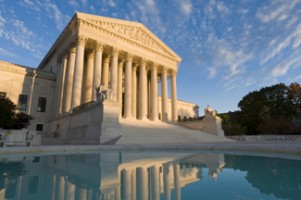Supreme Court to Consider Standing in ACLU Suit Challenging 'Dragnet Surveillance'

Image from Shutterstock.
The U.S. Supreme Court has agreed to consider whether lawyers, journalists and human rights groups have standing to challenge a federal wiretap law.
The American Civil Liberties Union, which filed suit on behalf of the plaintiffs, says in a press release that the law allows the National Security Agency “to conduct dragnet surveillance of Americans’ international emails and phone calls.” At issue are 2008 amendments to the Foreign Intelligence Surveillance Act giving the government broader power to monitor electronic communications if the targets are foreigners outside the United States.
The plaintiffs claim they fear their conversations with people overseas are being wiretapped, but the Obama administration says the asserted future injuries are “conjectural and not imminent.” The New York Times, the Los Angeles Times, the Associated Press and Reuters have stories on the cert grant.
The New York-based 2nd U.S. Circuit Court of Appeals had found the plaintiffs had standing, and then split 6-6 on whether to grant an en banc review. Chief Judge Dennis Jacobs issued an opinion opining that the plaintiffs did not have standing.
“As best I can see,” he wrote, “the only purpose of this litigation is for counsel and plaintiffs to act out their fantasy of persecution, to validate their pretensions to policy expertise, to make themselves consequential rather than marginal, and to raise funds for self-sustaining litigation.”
Jacobs compared the suit to a “plaintiff’s allegation that the CIA is controlling him through a radio embedded in his molar.”



